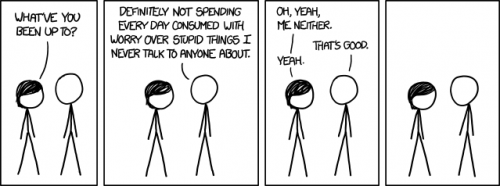
The question of what causes anxiety is one to which we’ve given an embarrassing amount of attention, especially within the context of Christianity. The Onion was good to remind us that “Anxiety [Isn’t] Resolved By Thinking About It Really Hard”, but the relationship between religion and anxiety is a fascinating and potent one; i.e., the decline of religion and rise of anxiety may not be completely independent phenomena… but by “decline of religion” we don’t just mean secularization, but also certain shifts within religion itself.
 As a Church called to look for the plank in our own eyes, I think our complicity in the rise of anxiety is as good a place as any to start – bringing in some thinkers who’ve helped elucidate the problem in somewhat more philosophical/theological terms. The aim is a rough, broad-brush narrative of ideas in theology, and their manifestations in Christian life, which contribute to the current ‘epidemic’ of anxiety.
As a Church called to look for the plank in our own eyes, I think our complicity in the rise of anxiety is as good a place as any to start – bringing in some thinkers who’ve helped elucidate the problem in somewhat more philosophical/theological terms. The aim is a rough, broad-brush narrative of ideas in theology, and their manifestations in Christian life, which contribute to the current ‘epidemic’ of anxiety.
One culprit is a distinctly modern, highly scientific epistemology (theory about how we know things), as is the inordinately high view of human perception it entails. A scientific mindset, that is, only trusts the reality of things which are readily observable; there’s not much room for trust “in things unseen”. Optimism about our perception serves as an instrument of angst, as it inhibits true assurance and certitude. And by “perception” we mean not only the five external senses, but also and especially the organic and emotional senses.
In a modern, scientific view of the self, humans are capable of knowing and perceiving fully that which is around them. If we had to pick a starting-point for this in some ‘history of ideas’, Descartes would be an ideal place. Catherine Pickstock, a Cambridge theologian, explains and critiques Descartes’s epistemology in her wonderfully provocative After Writing:
“Descartes delimits the knowable by ruling that one should attend only to that which manifests itself clearly and distinctly, that is, ‘to those objects of which our minds seem capable of having certain and indubitable cognition.’ This departure from the [much earlier] notion of being as something with unknowable and unanalysable depth, inaugurates the ‘object’ as a phenomenon. There arises, therefore, an epistemological circuit whereby knowledge is based entirely on objects, whose ‘being’ does not exceed the extent to which they are known. Representation is now prior to ontology.”
“Whose ‘being’ does not exceed the extent to which they are known.” Humans, therefore, may now only know to the extent that they perceive. Rather than something open-ended and fundamentally ungraspable, objects are now defined by the way in which a person perceives them. Pickstock concludes that “by defining being as the unvarying, clear, and distinct, [Descartes’s assumed ontology] subordinates it to the measure of the knowing subject, and finally places its objectivity in doubt [emphasis added]”. Paradoxically, Descartes’s search for objectivity placed knowledge even more within the realm of subjectivity. There is now in place a law of perception – for something to be real, we must grasp it fully.
Subordinating truth to the measure of the knowing subject – haven’t we all been there? ‘Prove it!’, or “I just have to see it for myself” are expressions of our need to experience truth directly; in a church setting, this often means a need to feel something during the Eucharist, or a need to feel close to God. To say we can be close to God without feeling that way is a gracious word, but to us a counterintuitive one.
Religiously speaking, Pickstock’s analysis implies that we will assume God to be present where we can sense him, and we will assume he’s absent where we cannot. If ontology preceded representation, to use Pickstock’s terms, in the believer’s approach to the world, she could be assured that, even if she did not sense God’s presence or work in a particular phenomenon or sphere of existence, it would still be there.
When perception precedes ontology, however, the individual cannot be assured of anything she does not already perceive. The question of which aspects of creation are channels for experiencing God goodness—(a ‘modern’ question at the outset)—is now further complicated by Descartes’s centering of truth in individual perception. It is now very difficult for the believer be told anything contrary to her perception. The volatility and unreliability of human perception opens the door, furthermore, for human projection into God, since simply believing God is acting in a certain way could evoke the corresponding feeling and validate itself via emotional perception. The modern believer, then—with a fairly recent strand of Pentecostalism—will use his emotional perception to find the channels through which God works or the criteria for a direct encounter with the Spirit.
Emotional experience of God, overconfidence in our own sanctification, our states of virtue or holiness – our perception is now the final criterion for these experiences. No wonder there’s a “crisis of authority” in religion today. Consigning much of our spirituality to the realm of the unknowable implies a posture of trust and allows us, psychologically, to leave some of these questions to God. But when our spiritual criteria become perceivable, we will either be passing or failing constantly. Thus the tendency toward extreme egoism, in many Evangelical churches, and extreme despair, from those whose efforts have failed them. In daily life, all of us waffle between these extremes – and that untenable middle space is best described by spiritual anxiety.
In contrast to this high view of human perception, the biblical view affirms the limits of mankind’s perceptual powers. In one of his Psalms, David discusses God’s omnipresence:
Where shall I go from your Spirit?
Or where shall I flee from your presence?
If I ascend to heaven, you are there!
If I make my bed in Sheol, you are there!
If I take the wings of the morning
and dwell in the uttermost parts of the sea,
even there your hand shall lead me,
and your right hand shall hold me.
If I say, “Surely the darkness shall cover me,
and the light about me be night,”
even the darkness is not dark to you;
the night is bright as the day,
for darkness is as light with you.
The Psalmist not only asserts God’s geographical omnipresence, but also he discusses God’s omnipresence with regard to human perception. David’s meaning of “darkness” here likely includes times of suffering and personal hardship in which God may not seem to be present or active, as in John of the Cross’s “Dark Night” of the soul. Although the Psalmist perceives only darkness, he can nonetheless objectively confirm and be comforted by the fact of God’s equal presence in that which seems darkness and that which seems light. His belief in a perceptual plane higher than his own is the basis for his knowledge that the “night is bright as the day.” Although the Psalmist may assert God’s geographic and phenomenal omnipresence, an overconfidence in our spiritual self-evaluations suggests that “darkness” does in fact imply God’s absence or inactivity with regard to a certain experience or sphere of life.
In contrast to the Psalmist’s view, which expresses objective comfort amidst a total lack of human agency, the modern scientific believer may use his perception to try to control God. By believing God is working in a situation or that certain human emotions are Spirit-given, the person may effectively edit God out of or into certain worldly circumstances. The ease of this self-convincing inserts yet more room for control into spiritual life but, because such control necessarily tampers with the truth, truth itself is diluted – another venue for anxiety and doubt.
This seems like semi-fertile ground to extrapolate a few reasons for a fetishization of emotionally knowable spiritual experience, on the Pentecostal end; intellectually knowable theology or Scripture, on a more Reformed end; or finally a morally knowable fetishization of personal holiness, which seems to run the gamut. In the Psalmist’s “darkness” on these fronts – feeling an acute emotional absence of God, undergoing intense intellectual uncertainty, or watching oneself sin and relapse again and again, the assurance that “darkness is not darkness to you” continues to speak with power.

COMMENTS
9 responses to “Modern Origins of Anxiety: Scientific Christianity and Perceptive Optimism”
Leave a Reply
















What? This is the THIRD awesome article from Mbird today. Thanks!
Very appropriate X-Files episode reference.
http://en.wikipedia.org/wiki/Darkness_Falls_(The_X-Files)
Religiously speaking, Pickstock’s analysis implies that we will assume God to be present where we can sense him, and we will assume he’s absent where we cannot.
Or we’ll assume worse, as taught in the guilt-inducing phrase “If you no longer feel close to God, who moved?”
Thanks, Will. I always make it a point to read your posts.
as someone who is constantly (although not clinically) anxious, this is very helpful. Thx WMD (see what I did there?).
Great stuff – the early Barth would be exceedingly proud! As would the younger Blumhart. My question is to what extent is there a positive experience on the other side of the negative? If so, then how one might avoid the positive becoming its’ own idol of control.
Brilliant. Welcome exemption of Jesus the Prophet and Christ the Messiah.